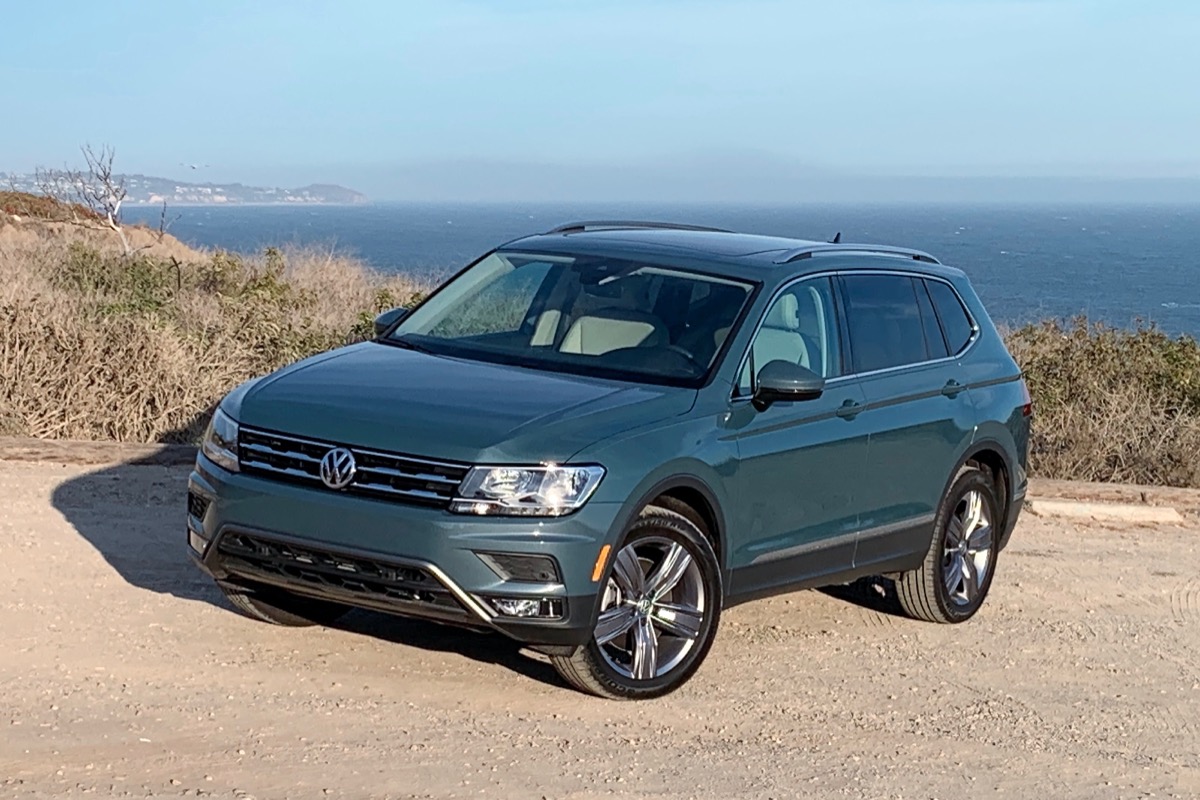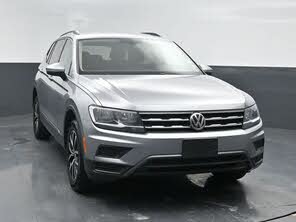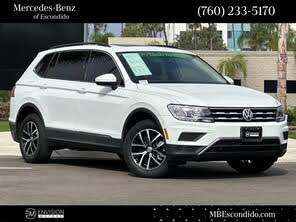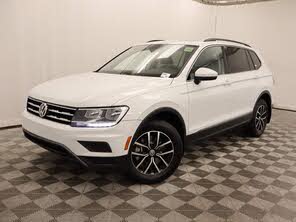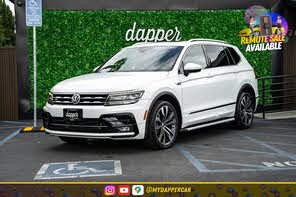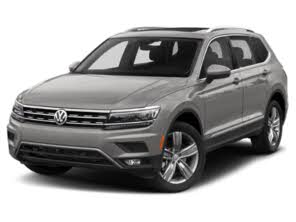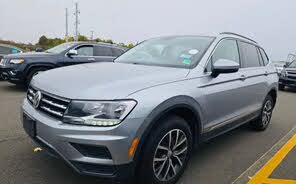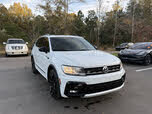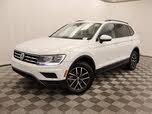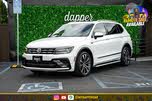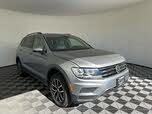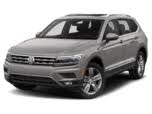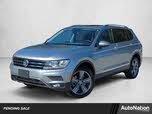2021 Volkswagen Tiguan vs 2020 Volkswagen Tiguan
Overview | |
MSRP$24,945 | MSRP$25,245 |
Listings914 | Listings1315 |
Ratings & Reviews | |
User Reviews | User Reviews |
Expert reviews7.7 out of 10 | Expert reviews7.3 out of 10 |
Pros
Cons
| Pros
Cons
|
2020 Volkswagen Tiguan Reviews SummaryThe Volkswagen Tiguan is one of only two compact crossover SUV’s that currently offer third-row seating. (And the other is the hopelessly outdated Mitsubishi Outlander.) To fit the extra pair of surprisingly spacious seats, VW made the Tiguan much larger than average for its competitive set—which suits a vehicle that fills big shoes in VW dealerships. With five trim levels and prices that stretch from just under $26,000 to a bit over $40,000, the Tiguan is the German brand’s best-selling vehicle in the U.S. | |
2021 Volkswagen Tiguan Reviews SummaryYou may have noticed that crossover SUVs are popular. Among them, compact models dominate, having essentially replaced the traditional midsize sedan in American driveways. Offering room for five people, available all-wheel drive (AWD), and more cargo than any family car, they are the preferred method of transportation for a broad cross section of new vehicle buyers. But that’s not the only explanation for the runaway success of the 2021 Volkswagen Tiguan. | |
No video found | No video found |
Popular Features & Specs | |
Engine2.0L 184 hp I4 | Engine2.0L 184 hp I4 |
Drive TrainFWD | Drive TrainFWD |
Seating Capacity7 | Seating Capacity7 |
Horsepower184 hp @ 4400 rpm | Horsepower184 hp @ 4400 rpm |
MPG City22 | MPG City23 |
MPG Highway29 | MPG Highway29 |
Engine | |
Engine Name2.0L 184 hp I4 | Engine Name2.0L 184 hp I4 |
Torque221 lb-ft @ 1600 rpm | Torque221 lb-ft @ 1600 rpm |
Horsepower184 hp @ 4400 rpm | Horsepower184 hp @ 4400 rpm |
DrivetrainFWD | DrivetrainFWD |
Fuel Economy | |
MPG City22 | MPG City23 |
MPG Highway29 | MPG Highway29 |
Interior | |
Seating Capacity7 | Seating Capacity7 |
Safety | |
Front Crash Overall4 | Front Crash Overall4 |
Side Crash Overall5 | Side Crash Overall5 |
Dimensions & Capacity | |
Cargo Space12.0 cu ft | Cargo Space12.0 cu ft |
Curb Weight3757 lbs | Curb Weight3735 lbs |
Height66.3 in | Height66.3 in |
Length185.1 in | Length185.1 in |
Width72.4 in | Width72.4 in |
Wheelbase109.8 in | Wheelbase109.8 in |
Maximum Payload1124 lbs | Maximum Payload1146 lbs |
Number of doors4 | Number of doors4 |
Maximum Towing Capacity1500 lbs | Maximum Towing Capacity1500 lbs |
Overview | ||
MSRP | $24,945 | $25,245 |
Listings | ||
Ratings & Reviews | ||
User reviews | ||
Expert reviews | 7.7 out of 10Read full review | 7.3 out of 10Read full review |
Pros & cons | Pros
Cons
| Pros
Cons
|
Summary | The Volkswagen Tiguan is one of only two compact crossover SUV’s that currently offer third-row seating. (And the other is the hopelessly outdated Mitsubishi Outlander.) To fit the extra pair of surprisingly spacious seats, VW made the Tiguan much larger than average for its competitive set—which suits a vehicle that fills big shoes in VW dealerships. With five trim levels and prices that stretch from just under $26,000 to a bit over $40,000, the Tiguan is the German brand’s best-selling vehicle in the U.S. | You may have noticed that crossover SUVs are popular. Among them, compact models dominate, having essentially replaced the traditional midsize sedan in American driveways. Offering room for five people, available all-wheel drive (AWD), and more cargo than any family car, they are the preferred method of transportation for a broad cross section of new vehicle buyers. But that’s not the only explanation for the runaway success of the 2021 Volkswagen Tiguan. |
Video | No video found | No video found |
Popular Features & Specs | ||
Engine | 2.0L 184 hp I4 | 2.0L 184 hp I4 |
Drive Train | FWD | FWD |
Seating Capacity | 7 | 7 |
Horsepower | 184 hp @ 4400 rpm | 184 hp @ 4400 rpm |
MPG City | 22 | 23 |
MPG Highway | 29 | 29 |
Engine | ||
Engine Name | 2.0L 184 hp I4 | 2.0L 184 hp I4 |
Torque | 221 lb-ft @ 1600 rpm | 221 lb-ft @ 1600 rpm |
Horsepower | 184 hp @ 4400 rpm | 184 hp @ 4400 rpm |
Drivetrain | FWD | FWD |
Fuel Economy | ||
MPG City | 22 | 23 |
MPG Highway | 29 | 29 |
Interior | ||
Seating Capacity | 7 | 7 |
Safety | ||
Front Crash Overall | 4 | 4 |
Side Crash Overall | 5 | 5 |
Dimensions & Capacity | ||
Cargo Space | 12.0 cu ft | 12.0 cu ft |
Curb Weight | 3757 lbs | 3735 lbs |
Height | 66.3 in | 66.3 in |
Length | 185.1 in | 185.1 in |
Width | 72.4 in | 72.4 in |
Wheelbase | 109.8 in | 109.8 in |
Maximum Payload | 1124 lbs | 1146 lbs |
Number of doors | 4 | 4 |
Maximum Towing Capacity | 1500 lbs | 1500 lbs |
Volkswagen had completely revamped the Tiguan's look in 2018, moving from its first generation to a sleeker, more capacious second generation. By 2020, this compact crossover SUV had retained its characteristic conservative German design, with sleek and clean lines. It boasted a new flat VW logo on a horizontal grille that ran the full width of the front fascia, seamlessly connecting the headlights.
While some might have found the stylings straightforward rather than adventurous, the exterior's simplicity had its appeal. The Tiguan's design philosophy was about creating cars that looked timeless and classic without any overtly aggressive features.
The scenario changed somewhat when one stepped inside. Despite Volkswagen’s historic prowess in interior design, the 2020 Tiguan's cabin lacked the enchantment of its predecessors. Dull surfaces and hard black plastics were evident, giving the interior an unexpectedly plain appearance. It failed to attain the crisp, refined look VW used to be known for. Glossy displays and a chic optional digital dashboard did modernize the cabin to an extent, but these elements couldn't wholly offset the otherwise uninspired design choices.
The 2021 Volkswagen Tiguan sustained the clean lines and balanced proportions introduced in the second generation, delivering an understated, timeless design that might have appeared boring to some but held a certain elegance to others. Its conservative and upscale aesthetic ensured it would age gracefully.
Sizewise, the Tiguan was one of the largest in its class, comparable to the Hyundai Santa Fe and Kia Sorento. This was a conscious decision by Volkswagen to address the size criticisms of the first-generation Tiguan, adding a long-wheelbase version for more spacious interiors.
Internally, the 2021 Tiguan was roomy and accommodating, comfortably seating four adults and extending to seven with an optional third row (although the third row was best suited for children). The interior's precision was typical of German engineering, with geometric forms and a purposeful control layout, albeit with occasional quirks like the oddly placed engine start button. Despite shiny detailing and available digital instrumentation, the cabin contained too much hard plastic to compete with high-end rivals like Audi.

















All 2020 Tiguan models featured a turbocharged 2.0-liter four-cylinder engine that produced 184 horsepower and 221 lb-ft of torque. This power was delivered through an eight-speed automatic transmission to either the front wheels or all four wheels, with AWD being a $1,300 option. The engine’s primary focus was on torque, which was crucial given the vehicle's substantial size—between 3,757 pounds for FWD and 3,847 pounds for AWD.
While the Tiguan's powertrain provided a brisk throttle response and minimal turbo lag, the nearly 4,000-pound curb weight resulted in moderate performance. The automatic transmission was smooth and quick to downshift, but highway passing required patience. Engine noise was generally subdued, and the cabin was insulated from wind noise, making it a quiet cruiser. However, road noise penetrated on rough surfaces.
Handling-wise, the Tiguan’s larger size and longer wheelbase impacted its nimbleness. The suspension provided a comfortable ride on various terrains, yet sport mode left the steering only marginally firmer. Though not the most dynamic to drive, the Tiguan remained a competitive choice in its size class.
The 2021 Tiguan also used Volkswagen’s turbocharged 2.0-liter four-cylinder engine, producing the same 184 horsepower at 4,360 rpm and 221 lb-ft of torque at a low 1,600 rpm. Power was again managed through an eight-speed automatic transmission. The 4Motion AWD system, now a $1,400 option on most models, came standard on the SEL Premium R-Line.
Despite its output, the engine suffered from noticeable turbo lag, making it seem less responsive under certain conditions. The vehicle's nearly 4,000-pound curb weight compounded the engine’s breathlessness during demanding driving scenarios like highway passing.
According to the EPA, the 2021 Tiguan delivered 25 mpg in combined driving for FWD models and 24 mpg for AWD. Our tests revealed an average of 22.6 mpg, showing minimal fuel economy gains despite the lag in performance.
Driving experience in the 2021 Tiguan was generally pleasant, with light but responsive steering, a compliant ride, and manageable handling. However, its suspension’s lack of refinement became apparent over rougher terrains like speed bumps and railroad tracks. Enthusiasts looking for a sporty ride would find the Tiguan lacking in corner grip and control but would appreciate its composed highway manners.
The 2020 Tiguan’s biggest strength was its practicality. The second row of seats could slide up to seven inches, making the third row genuinely usable. Though this third row was tight for adults, it provided reasonable legroom for kids. Front-drive models included the third row as standard, while AWD models offered it for an additional $595.
Storage was a strong point, with a fold-flat split second row allowing cargo space to expand to 65.7 cubic feet when the third row was down. Two-row Tiguans boasted 73.5 cubic feet of cargo space, outperforming many competitors like the Ford Escape and Toyota RAV4, though just shy of the Honda CR-V’s 75.8 cubic feet.
Front occupants enjoyed a relatively roomy space comparable to larger midsize SUVs. The Tiguan’s wide design provided ample hip and shoulder room, and the large windows enhanced the sense of spaciousness.
Comfort was a priority in the 2021 Tiguan, featuring large doors and high seating positions for easy ingress and egress. The front seats offered substantial adjustments, ensuring support and visibility. The V-Tex leatherette upholstery closely mimicked real leather, and the dual-zone climate control system was efficiently robust.
Rear-seat occupants enjoyed generous legroom, air conditioning vents, USB charging ports, and cushy front seatbacks. This made even tall passengers comfortable. For parents, the ample rear clearance was beneficial when installing a reverse-facing child seat.
The configurable 40/20/40-split rear seat allowed for versatile cargo and passenger combinations. Cargo volume in three-row models ranged from 33 to 37.6 cubic feet behind the second row, extending to 73.5 cubic feet with the seats folded flat. This made the 2021 Tiguan just as practical as its predecessor.
The 2020 Tiguan featured Volkswagen’s MIB II infotainment system, with S trims coming with a 6.5-inch touchscreen and higher trims equipped with a superior 8-inch capacitive touchscreen. The MIB II system was user-friendly, featuring bright graphics, a responsive processor, and a glass surface that added to its sleek appearance.
USB-C ports were scarce in the 2020 model, with higher trims offering USB-A ports instead. Wireless charging and VW's Digital Cockpit, a fully digital customizable instrument panel, were bonuses in higher trims, further enhancing the tech experience.
In 2021, Volkswagen introduced the MIB3 system in the SE trim and above. This new generation platform included an 8-inch touchscreen, faster processing speeds, and a suite of advanced features. Wireless Apple CarPlay, Android Auto, and WiFi for up to four devices were significant improvements. The system also featured Amazon Alexa compatibility and a host of Car-Net connected services.
Despite these upgrades, the MIB3 system had some user-interface quirks, and voice recognition was subpar. The standard six-speaker audio system underperformed, while the SEL Premium R-Line’s nine-speaker Fender audio system offered a marked improvement.
The 2020 Tiguan’s standard safety features included forward-collision warning, automatic emergency braking, blind-spot monitoring, and rear cross-traffic alert. Adaptive cruise control and lane-keep assist were reserved for the higher SEL trim. Car-Net telematics enhanced safety with remote locking, status checks, and vehicle location.
According to the IIHS, the 2020 Tiguan was a Top Safety Pick for SEL Premium models equipped with LED headlights. Halogen headlights on lower trims received poor ratings, and the NHTSA had not completed crash tests.
The 2021 Tiguan expanded its safety suite with IQ Drive, including forward-collision warning, pedestrian detection, automatic emergency braking, and blind-spot monitoring as standard. Adaptive cruise control came with the SE trim, while lane-departure warning and automatic high-beams were reserved for higher trims.
The adaptive cruise control exhibited smooth braking, although it wasn’t always quick to respond. Lane-keep assist and blind-spot monitoring were effective, though occasionally inconsistent. Parking sensors and surround-view cameras in upper trims added to its safety profile.
The IIHS rated the 2021 Tiguan a Top Safety Pick in the SEL and SEL Premium R-Line trims, primarily due to their LED headlight performance. The NHTSA does not have complete crash-test data for this model.
CarGurus highlights

According to CarGurus experts, the overall rating for the 2020 Volkswagen Tiguan is 7.7 out of 10, while the 2021 Volkswagen Tiguan scores 7.3 out of 10. Given these ratings, the 2020 Volkswagen Tiguan edges out as the better choice, offering a balance of practical features, a user-friendly infotainment system, and respectable safety and comfort. If cutting-edge technology and enhanced safety are paramount, the 2021 model offers compelling advancements, but the 2020 Tiguan’s higher overall rating and well-rounded package make it the recommended pick.
Choose the 2021 Volkswagen Tiguan if:
- You want the most up-to-date infotainment technology, including wireless smartphone integration.
- Advanced safety features like IQ Drive are a priority for your peace of mind.
- You prefer a more comfortable seating arrangement with high-grade materials and substantial adjustments.
Choose the 2020 Volkswagen Tiguan if:
- You value practicality and need a third row of seats for occasional use.
- You prefer a simpler, user-friendly infotainment system with proven reliability.
- You desire a quieter cabin with decent highway cruising capabilities.
CarGurus highlights

According to CarGurus experts, the overall rating for the 2020 Volkswagen Tiguan is 7.7 out of 10, while the 2021 Volkswagen Tiguan scores 7.3 out of 10. Given these ratings, the 2020 Volkswagen Tiguan edges out as the better choice, offering a balance of practical features, a user-friendly infotainment system, and respectable safety and comfort. If cutting-edge technology and enhanced safety are paramount, the 2021 model offers compelling advancements, but the 2020 Tiguan’s higher overall rating and well-rounded package make it the recommended pick.
Choose the 2021 Volkswagen Tiguan if:
Shop Now- You want the most up-to-date infotainment technology, including wireless smartphone integration.
- Advanced safety features like IQ Drive are a priority for your peace of mind.
- You prefer a more comfortable seating arrangement with high-grade materials and substantial adjustments.
Choose the 2020 Volkswagen Tiguan if:
Shop Now- You value practicality and need a third row of seats for occasional use.
- You prefer a simpler, user-friendly infotainment system with proven reliability.
- You desire a quieter cabin with decent highway cruising capabilities.

By: CarGurus + AI
At CarGurus, our team of experienced automotive writers remain at the heart of our content operation, conducting hands-on car tests and writing insightful guides that are backed by years of industry experience. To complement this, we are harnessing AI to make our content offering more diverse and more helpful to shoppers than ever. To achieve this, our AI systems are based exclusively on CarGurus content, ratings and data, so that what we produce is both unique to CarGurus, and uniquely helpful to car shoppers.
